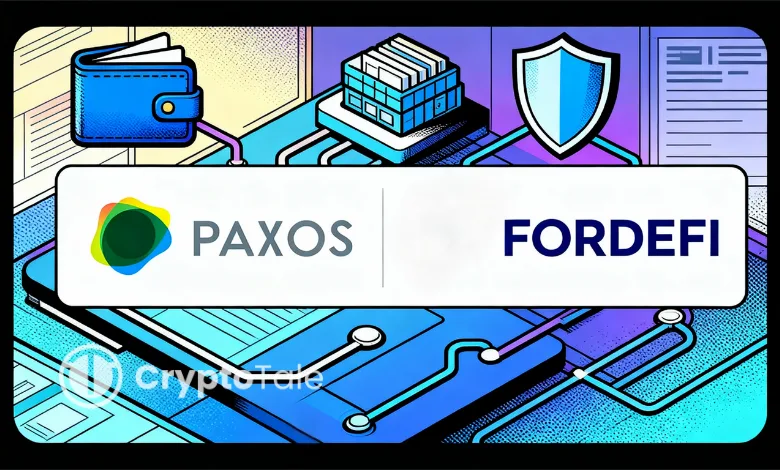Paxos’ Fordefi Deal Signals Push Into Regulated DeFi

- Paxos’ Fordefi deal merges MPC wallet tech with regulated custody for safer DeFi access.
- Fordefi’s MPC platform spans over 90 chains and boosts institutional security controls.
- Deal shows rising demand for compliant DeFi rails and stronger institutional systems.
Paxos confirmed on November 25 its plan to acquire Fordefi for over $100 million to expand regulated access to decentralised finance. CEO Charles Cascarilla said institutional clients want secure wallet rails that support compliant on-chain activity without exposure gaps. The deal integrates MPC wallet technology into Paxos custody.
From Custody to Full-Stack Transaction
Fordefi will continue operating independently while Paxos plans phased integration of its technology into custody systems. The firm runs MPC-based wallets that split signing authority, reducing the risk of single-point failure.
It supports around 300 institutions and processes more than $120 billion in monthly transaction volume. However, Paxos aims to align this infrastructure with its regulated custody framework for unified institutional access.
Paxos described the acquisition as its second major deal in the past year, following its purchase of Membrane Finance. That move strengthened its operations under European MiCA rules. It also launched Paxos Labs to develop embedded DeFi tools for partner platforms.
Cascarilla said clients want regulated entry points into decentralised finance markets. He stressed that enhanced control layers remain vital for secure participation. According to Paxos, institutions demand solutions that balance compliance with flexible transaction execution. This strategy directly shows growing institutional pressure for safer DeFi participation.
Trust-Layer Firms and Wallet Control Systems
The acquisition is a wider shift among trust-layer companies, including Paxos, Circle, and Fireblocks. These firms now prioritise full-stack transaction infrastructure rather than simple custody offerings. This includes policy controls, compliance monitoring, and advanced approval systems. Wallet technology has therefore become central to institutional access into permissionless DeFi environments.
Fordefi supports more than 90 blockchains and embeds compliance tools directly into transaction workflows. It also offers real-time approval systems that block unverified activity. However, the platform remains operationally independent while preparing for deeper integration. This structure helps maintain service continuity during transition.
Josh Schwartz, Fordefi’s CEO, said the acquisition broadens access while preserving its security focus. He confirmed continued development operations across New York and Tel Aviv. Fordefi employs around 40 staff and maintains its existing client base, ensuring stability throughout integration.
Paxos also issues stablecoins for the Hyperliquid platform, including PayPal USD, USDG, and USDH. These assets support tokenized finance and decentralized lending. Partnerships with PayPal and Nubank expand access to crypto trading. Therefore, the Fordefi acquisition enhances infrastructure rather than replacing current offerings.
Related: Paxos Joins Circle, Ripple in Applying for OCC Trust Charter
Institutional Race for Regulated Defi Rails
Institutions continue acquiring wallet infrastructure to access decentralised networks securely. There has been increasing integration between traditional financial platforms and blockchain systems. Paxos positions its transaction stack within this broader change toward regulated DeFi infrastructure.
The acquisition responds to direct institutional demand for controlled DeFi interaction. Paxos said clients require strong audit trails and traceable settlement processes. It also highlighted the need for compliance-ready execution tools across decentralized environments. Fordefi’s systems align with these technical and operational requirements.
Fordefi specialises in institutional-grade transaction security and asset protection. It applies command controls and layered security to prevent exposure risks. These features allow institutions to operate within decentralized systems while maintaining oversight. This model fits the expectations of regulated financial entities.
Paxos confirmed that Fordefi supports large-scale institutional users and decentralised protocols. The deal shows rising consolidation across regulated digital asset infrastructure providers. It also signals deeper alignment between compliance oversight and decentralised finance access. Transaction control systems now define how regulated capital enters permissionless networks.
Paxos noted that Fordefi has seen its valuation grow since its last $83 million funding round. The final acquisition exceeded prior estimates, indicating rising demand for compliant wallet infrastructure. This trend shows increased institutional reliance on secure transaction frameworks.
Paxos plans to embed Fordefi tools across custody, settlement, and DeFi access channels. The integration prioritises security without disrupting current services. Operational control remains central to the strategy.
The company also continues expanding globally following its European regulatory advancements. It aims to support regulated bodies across multiple jurisdictions. This positions Paxos as a structured participant in institutional DeFi infrastructure.
The unified strategy connects custody, wallet systems, and transaction execution. Compliance layers operate alongside on-chain access points. This approach enables institutions to meet regulatory requirements while engaging decentralised markets.
Meanwhile, Paxos acquisition of Fordefi is a controlled change toward regulated DeFi infrastructure. The deal integrates MPC wallet systems with compliant custody frameworks. This move shows how institutions now approach decentralized transaction control through secure and regulated channels.




